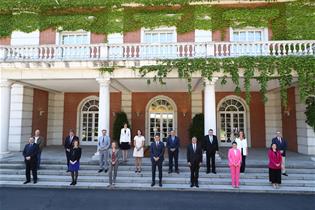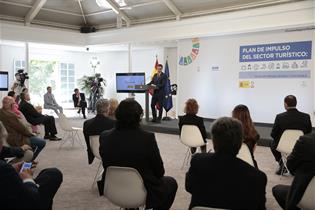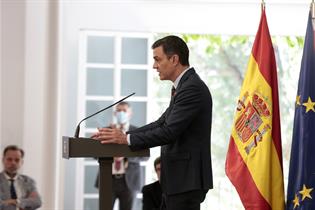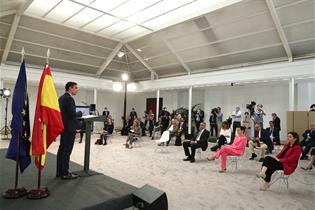Plan to boost a safe and sustainable tourism sector post-COVID-19
Government of Spain strengthens tourism with a Strategic Plan worth 4.26 billion euros
President's News - 2020.6.18
Video presentation of the campaign to boost the tourism sector | Pool Moncloa / Jorge Villar - 2020.6.18
Moncloa Palace, Madrid
This new Plan to Boost the Tourism Sector contains 28 measures structured around five lines of action: the recovery of confidence in the destination (a 360º safe destination), the introduction of measures to reactivate the sector, heightened competitiveness of the tourist destination, a better knowledge model and smart tourism, and a marketing and promotion campaign.
The Plan has an allocation of 4.26 billion euros. Following this initiative, the government's commitment to the tourism sector rises to total support of 19.54 billion euros since the start of the pandemic, after the activation of different urgent measures to support the Spanish economy, which have resulted in an injection of 15.27 billion euros for tourism in our country, benefitting both workers and companies.
The tourism value chain is one of the economic activities most affected by the current coronavirus health crisis. This new Plan to Boost the Tourism Sector will help a fundamental sector of the economy to recover in all autonomous regions, which accounts for 12% of Spain's Gross Domestic Product, employing 13.6% of all National Insurance contributors in our country at the start of 2020.
 Pool Moncloa/Fernando CalvoThe President of the Government of Spain, Pedro Sánchez, highlighted that "Spain is open to tourists again. Today we present a plan to boost the industry to relaunch tourism. We are global leaders. That is why each step we take must be a safe step. We will always take them with responsibility and prudence to show that Spain is a safe and healthy destination".
Pool Moncloa/Fernando CalvoThe President of the Government of Spain, Pedro Sánchez, highlighted that "Spain is open to tourists again. Today we present a plan to boost the industry to relaunch tourism. We are global leaders. That is why each step we take must be a safe step. We will always take them with responsibility and prudence to show that Spain is a safe and healthy destination".
The Secretary-General of the United National World Tourism Organization (UNWTO), Zurab Pololikashvili, expressed his commitment and collaboration in boosting Spanish tourism. "We can once more place Spain as the capital of world tourism".
The event, held at Moncloa Palace, was attended by Nadia Calviño, Third Vice-President of the Government and Minister for Economic Affairs and Digital Transformation; María Aránzazu González, Minister for Foreign Affairs, European Union and Cooperation; José Luis Ábalos, Minister for Transport, Mobility and Urban Agenda; Reyes Maroto, Minister for Industry, Trade and Tourism; José Manuel Rodríguez, Minister for Culture and Sport; José Luis Escrivá, Minister for Inclusion, Social Security and Migration; Miguel Ángel Cilleros, Secretary-General for Tourism of the UGT; José María Martínez, Secretary-General for Services of CCOO; Juan Cierco, President of the Tourism Committee of the Spanish Chamber of Commerce; Marta Blanco, President of the Tourism, Culture and Sport Council of the CEOE; Alfonso Rodríguez, President of the Tourism Committee of the FEMP; Yaiza Castilla, Tourism, Industry and Trade Councillor of the Regional Government of the Canary Islands; Sonia Pérez, Tourism, Trade and Consumer Affairs Councillor of the Regional Government of the Basque Country; and Zurab Pololikashvili, Secretary-General of the United National World Tourism Organization.
Recover confidence in the destination - a 360º safe destination
Confidence in the safety of the tourist destination is key for tourists to consider taking a trip. Following the impact of the health crisis, Spain needs to recover this confidence, adopting all necessary measures to guarantee the well-being of tourists to the maximum. In this regard, we must ensure that all the links on the value chain of the tourism sector incorporate the specific health and hygiene measures appropriate to them, thus inspiring confidence in travellers.
 Pool Moncloa/J.M.CuadradoTo achieve this, the Plan has activated 200,000 euros to draw up 21 guides of specifications to prevent the spread of the coronavirus SARS-COV-2, which include measures to disinfect spaces and other cleaning conditions, rules on capacity and social distancing promoted by the sector and endorsed by the health authorities.
Pool Moncloa/J.M.CuadradoTo achieve this, the Plan has activated 200,000 euros to draw up 21 guides of specifications to prevent the spread of the coronavirus SARS-COV-2, which include measures to disinfect spaces and other cleaning conditions, rules on capacity and social distancing promoted by the sector and endorsed by the health authorities.
Furthermore, the creation of a special badge is promoted to publicise those establishments that are committed to following the indications contained in the guides and work is being done on pilot projects to open up the country to inbound tourists through safe tourism corridors.
Measures to reactivate the sector
The coronavirus is a health crisis, but since travel demand has slowed down so extraordinarily, it has also become an economic crisis that affects the tourism sector, with a very direct repercussion on companies and jobs. Accordingly, this Plan includes a second pillar that mobilises 3.36 billion euros to focus on measures to reactivate the sector through employment measures, training and skills programmes in the sector and business liquidity and solvency.
The Plan to Boost the Tourism Sector has a preferential sub-tranche for the sum of 2.5 billion euros for the tourism sector in the form of an ICO line of guarantees in order to guarantee financing and liquidity.
In addition, a mechanism is established that allows a grace period of 12 months to be authorised for those financial operations with a mortgage guarantee, signed up to by independent contractors and companies whose property is used for an activity in the tourism sector, including accommodation.
 Pool Moncloa/J.M. CuadradoFurthermore, and taking into account the close relationship between the occasional transport sector and the tourism sector, the government will analyse a mechanism that allows creditor entities to apply a temporary suspension on obligations stemming from credit contracts without a mortgage guarantee, for contracts associated with the purchase of vehicles for occasional passenger transport.
Pool Moncloa/J.M. CuadradoFurthermore, and taking into account the close relationship between the occasional transport sector and the tourism sector, the government will analyse a mechanism that allows creditor entities to apply a temporary suspension on obligations stemming from credit contracts without a mortgage guarantee, for contracts associated with the purchase of vehicles for occasional passenger transport.
As part of this Plan, the Board of Directors of Aena has approved a commercial incentive with the aim of contributing to a rapid recovery of air traffic in Spain. Accordingly, each company will receive a discount in the average monthly landing fee for all those monthly operations on the Aena network that exceed the levels set - a 75% discount for the number of operations between the lower and the upper thresholds and a 100% discount for the number of operations in excess of the upper threshold.
Measures to improve competitiveness of tourist destination
A tourist country such as Spain must maintain its competitive edge and constantly adapt to the rules imposed by the market. Hence, the Plan to Boost the Tourism Sector includes a pillar on improving the competitiveness of the tourist destination with a financial allocation of 859 million euros.
Specifically, the State Financial Fund for Tourist Competitiveness (Spanish acronym: FOCIT) will back, by granting loans, projects developed by tourist companies aimed at improving competitiveness and at speeding up the transformation of the sector towards a more sustainable model, particularly those companies related to the use of renewable energies, the efficient use of resources, reusing water and recycling sustainable transport waste, and the digitalisation, innovation and modernisation of services. Furthermore, within the framework of this pillar, measures are included that focus on financing projects for the digitalisation, innovation and internationalisation of the tourism sector and tourist sustainability plans, among other measures.
Better model of knowledge and smart tourism
 Pool Moncloa/Fernando CalvoThis crisis has highlighted the need, more than ever, for indicators, figures and information in real time to foresee scenarios and conduct and implement, as the case may be, the right public policies. In this context, it is essential to redesign the current system of knowledge and smart tourism in Spain, taking into account the information needs of regional governments and of the sector.
Pool Moncloa/Fernando CalvoThis crisis has highlighted the need, more than ever, for indicators, figures and information in real time to foresee scenarios and conduct and implement, as the case may be, the right public policies. In this context, it is essential to redesign the current system of knowledge and smart tourism in Spain, taking into account the information needs of regional governments and of the sector.
This new model of knowledge must focus on the analysis of international demand by strengthening market information, analysing tourist variables and their development, and the creation of a new tourism model, aimed at the incorporation of new elements of knowledge to overcome the limitations the sector faces. In order to boost all these strands of work, the Plan introduces, among other measures, the creation of a new smart tourism observatory.
Branding and promotion campaign
The fifth pillar of this Plan to Boost the Tourism Sector - towards safe and sustainable tourism post-COVID-19 focuses on using marketing and promotional tools to position Spain as a safe and sustainable destination, both with a view to national and international tourism.
On the one hand, the reactivation of markets will focus on short-term actions that the network of Tourism Offices abroad will set in motion to quickly reactivate international tourism towards Spain. In addition, work will be done on a strong tourism strategy that culminates in the 2020-2024Strategic Plan.
Non official translation





